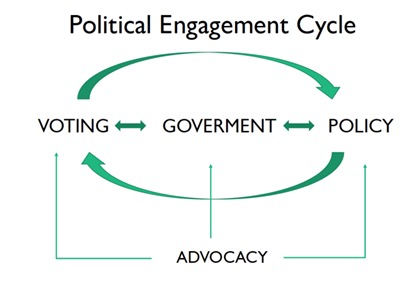Translating Between the Social and Political Determinants of Health
By Veronica Handunge, M.P.H.
In their 2023 APA Annual Meeting session, “Translating Between the Social and Political Determinants of Health,” Eric Rafla-Yuan, M.D., Mandar Jadhav, M.D., and Devika Bhushan, M.D., shared their policy and advocacy expertise with an audience of psychiatrists and other clinicians eager to understand how to make an upstream impact to address inequities in health outcomes.
While social determinants of health are the conditions under which people are born, live, work, and age, structural determinants including political determinants, are social and economic policies and governing processes that strongly influence social determinants. The session provided a historic lens on health-related legislation and real-life examples of how the speakers have used their voices and expertise to impact policy.
As Dr. Rafla-Yuan pointed out, “Health has always been political.” He shared that in 1946, the National Mental Health Act established the National Institutes of Mental Health (NIMH) to research causes, prevention, and treatment of mental health disorders. This was the first federal investment in mental health in the United States. It was, in part, a response to the U.S. military identifying the issue that too many people were unable to enlist due to mental health issues, creating a potential security threat. He went on to remind the audience that health disparities are often the outcomes of policy decisions—e.g., criminalization of mental illness, slavery, redlining, outlawing gender-affirming care, etc.
The session emphasized that politics and policy affect how clinicians practice and conveyed how physicians can adopt a social determinants-informed approach to practice and be agents of change in the political engagement cycle.

Building off the scholarship of Daniel E. Dawes, the session discussed the political engagement cycle which includes voting, government and policy. Advocacy–which impacts all parts of the political engagement cycle–is essential for achieving health equity. Even without direct government or policy roles, physicians can impact all parts of this cycle through advocacy to promote health equity.
The presenters then asked the audience: “Which part of the political cycle of health have you been involved in?”
Session presenters shared their own experiences, setting high standards for mental health clinicians hoping to impact the social determinants of health through political engagement:
- Rafla-Yuan discussed how he supported implementation of the 988 Suicide and Crisis Lifeline across the nation, as well as recent efforts in the state of California.
- Jadhav shared his success in using a combination of personal story and professional expertise to impact gun control policy and mental health funding at a federal level.
- Bhushan shared her role in addressing Adverse Childhood Experiences (ACEs) through statewide policy during her tenure as Acting Surgeon General of California
Unsurprisingly, one member of the audience reflected, “I’m struck by how involved you have been in policy changes so early in your careers…” and asked for insight into how the speakers became so politically active.
In turn, they responded:
I started residency at the same time as the 2016 presidential election. In residency, I saw the systemic issues that patients encounter – for instance, issues with homelessness and lack of resources, or at the southern border and how federal government was responding…and I started looking upstream… one of the most accessible ways to be involved as a trainee is through your local APA District Branch…I became a legislative director for a District Branch, then was on the board of our state psychiatric society, and it only grew from there…
Eric Rafla-Yuan, M.D., Chair of the APA Caucus on the Social Determinants of Mental Health and Former Jeanne Spurlock Congressional Fellow
As a medical student, I was dissatisfied with the medical model…I spent a lot of time in settings with physicians doing public health and policy work… For instance I spent time at the Baltimore City Health Department. I also worked on legislative advocacy while training as a postdoc at Stanford looking at gender equity and health. That’s where I met the California Surgeon General…A part of it is the right place at the right time with the right interest…and having the right mentors
Devika Bhushan, M.D., Senior Advisor, California ACEs Aware Initiative, formerly California’s Acting Surgeon General
Sometimes it’s sheer dumb luck, sometimes it’s your passion, your interest to consume information and be active with that information. The system of opportunities is growing and makes these things possible
Mandar Jadhav, M.D. Health Policy Advisor at the U.S. Senate and Former Jeanne Spurlock Congressional Fellow
Want to be more involved in APA’s work addressing social determinants of health? Join the APA Caucus on Social Determinants of Mental Health and become an agent for change in your own practice and community. Learn more at psychiatry.org/caucus
